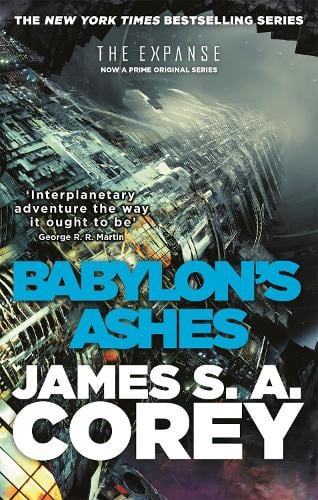 |
| Corey, James S.A. Babylon's Ashes. Orbit: 2016. |
When The Dark Knight Rises (clumsily!) began building up the
villain’s mystique of Bane, we knew two things right away: Batman would fight
him twice, and the first time he would be utterly defeated. It is this initial
defeat which increases the melodramatic payoff of his eventual victory: we know
how tough the enemy is, because we’ve seen it first-hand.
 |
| Bane = a worthy adversary; Inaros = an annoying fop |
A similar narrative convention is at work in books five
(Nemesis Games) and six (Babylon’s Ashes) of The Expanse. Marco Inaros is the
Bane of the solar system: he (to hear him retell it) single-handedly rocked
(see what I did there?) the inner planets’ equilibrium, nearly destroying Earth.
This corresponds to Bane’s initial victory over Batman; so far, so good. But
all of this build-up is to increase the melodrama when Batman (or in this case the
dynamic duo of Naomi Nagata and Jim Holden) eventually triumphs against this
formidable foe. And this is where, in my opinion, Babylon’s Ashes missteps.
It turns out Inaros just isn’t that compelling a villain, and
perhaps as a consequence of this, the good guys’ inevitable victory over him isn’t
particularly cathartic. In one sense that shouldn’t matter, since of course it’s
entirely up to Daniel Abraham and Ty Francks what sort of villain to create,
and nothing mandates a “tougher than you can believe” archetype. The problem,
as I see it, is that they fell into this narrative trope without having the
right sort of villain for it. Inaros is simply a megalomaniac with a flair
(sort of) for PR, but his ridiculous behavior and blunders end up alienating
many of his erstwhile supporters. This leeches the catharsis right out of the
mano y mano confrontation at the end, since in a manner of speaking Inaros has already
been beaten, in small ways, numerous times before this.
If the big, bad wolf who wrecked the solar system is nothing
more than a navel-gazing fool, it cheapens the hard work the crew of the Roci (et al) have to do to bring him to
heel. Indeed, we are left with a somewhat less favorable impression of the
super-crew, since defeating a moron like Inaros apparently taxed them to the
limit of their abilities! Surely there was something less explosive they could
have done to knock out all those rail guns in the ‘slow zone’? I mean, was that
really the best plan they could come up with, these brightest minds in the solar
system?
Despite Marco Inaros being a nincompoop, the writers chose
to focus a bit too much on him and in particular, his thirst for vengeance
against Holden, the man who kept humiliating him. Fair enough, to be obsessed
with a pissing contest seems in character for the petty Inaros, but why did the
writers let him and his quest to destroy Jim Holden dominate the story? A much
more compelling storyline, it seems to me, would have been in a more explicit
opposition between the methods and worldviews of Nagata and Inaros, since one
way of thinking of this book is as a battle for the soul of Filip, their son.
Besides, Nagata is a much more interesting character than Holden (of whose
earnestness, if we’re all being honest, we’re getting a bit tired, aren’t we?).
Nothing against Alex and Amos, but in general, the male
characters of this series just aren’t as compelling as the female ones: the
Naomis, Bobbies, Michios, and Clarissas (to say nothing of the indefatigable
Avasarala herself!). One humble suggestion for future installments in this
probably interminable series: stick with the ladies! (I’m happy to say that
their latest novella does precisely this, telling the story of an interesting
tweenaged girl growing up on Laconia—stay tuned for my review!)
The Math:
Objective assessment: 7/10
Bonuses: +1 for having such great female characters (but see
‘penalties’ below)
Penalties: -1 for the narrative mismatch between the fop
Inaros and his Bane-like mystique, -1 for focusing too much on the boring male
characters and too little on the ladies of the system!
Nerd coefficient: 6/10 “Still enjoyable, but the flaws are hard to ignore”
[Does a mere 6/10 seem low to you? Check out our scoring
system here, and learn why it’s actually not bad!]
Zhaoyun, who to be honest is more a fan of ‘spacemance’ than
of space opera per se, has been inhabiting The Expanse since it burst onto the
scene, and has been a regular(ish) contributor at Nerds of a Feather since
2013.